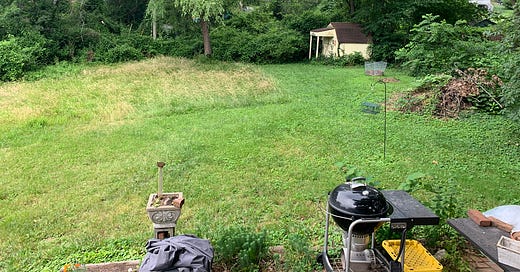Here in suburban Kansas, we have a big lawn that I don’t really take care of. Parts of it are over a foot high. There are weeds all over. Before you judge me, hear me out.
First of all, I confess up front that while I’m not naturally lazy, I’ve never enjoyed yard work. If that divides us because you’re one of those people who rides the Toro for 2-4 hours every weekend with a beer in the cupholder and the ballgame on your headphones, okay. But you’re missing the magic of a bad lawn.
When the sun comes up on my yard, it’s like a meadow. The gently rolling variations in colors and textures of a myriad of ground coverings is thrilling to behold. Tiny purple flowers bloom in mid-Spring. In summer, miniature wild strawberries feed dozens of species of birds. Clover, dandelions and other plants attract thousands of pollinators.
We keep a pretty big patch in the back that’s not mowed at all, and last night it was aglow with lightning bugs. There’s no chemicals applied to the lawn, so it’s loaded with insects and the animals that eat them, including birds all day, bats by night, and a fair number of garter snakes and smaller mammals.
We built a screened-in porch onto our post-war house, so we can watch it all in comfort. It cost a bunch, but we’ve never regretted it. Wealth comes in many forms, of which money is the least.
I could make the environmental case for my lawn, but others are doing that better than I ever could. You can google the anti-lawn movement, which is growing fast. Monocultural lawns are not only hard on the environment, they’re boring. In an age when the world is waking up to the horrors of our colonialistic conquests and the hell they’ve wrought upon the world, I find it charmingly subversive to let the land be what it wants to be by nature, and to discover the beauty of uncontrolled diversity.
The magic of a bad lawn isn’t just its beauty, but how that beauty affects people. The imagination takes over. The world comes alive. We begin to understand that control is vastly overrated, and that monocultural stretches of ground only suppress that which might be better. Metaphor about people, anyone?
There are, of course, invasive plants transported from their natural places, whose effect must be quelled. (Any intended metaphorical reference to people stops here, by the way.) And reversing human error is often quite difficult. We learn through these mistakes, I hope, to better consider what we think we want in favor of what already is. And to remember that what we can do because of our amazing human powers is not always what we should do. Perhaps the most powerful thing we possess as humans is not the ability to build tall buildings and massive roadways, although those things have their places. Perhaps the best part of us is our ability to acquire judgement, humility and restraint. And to question those whose desire is merely to control.
My wife and I are lucky to live in a neighborhood where there’s no homeowners association and the city and my neighbors are fairly chill about code violations of this nature. And that’s a blessing because of the many surprises we’re treated to, like the number of deer we saw in our neighborhood during the pandemic.
One day, a big, white-tail doe birthed her fawn in our backyard. My wife liked to call the doe “Fiona.” As deer do, she left the newborn curled up alone in the tall grass for hours, because its lack of scent will not draw predators, as her own presence will. When she returned to nurse it, my yellow labrador-mix, Beatrice, and I were standing on the deck. Fiona boldly walked up to within a few yards of us and, staring at us ominously, stomped her front foot. You don’t have to be a zoologist to recognize the threat. She was warning us to come no closer, protecting not only her baby, but her property — her ancestral home for hundreds of thousands of years — from the invaders. From us.
https://freakonomics.com/podcast/how-stupid-is-our-obsession-with-lawns/
https://downeast.com/land-wildlife/this-woman-wants-to-destroy-your-lawn/







Nothing like fire flies in a chemical free yard. They showed up at summer solstice this year. Your words paint a lovely picture!
Ah, I do sometimes miss the beauty of nature (including the nature of the unkempt lawn) in the Midwest. Thank you for this!